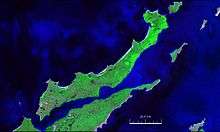Elcho Island

Elcho Island is an island off the coast of Arnhem Land, Northern Territory, Australia. It is located at the southern end of the Wessel Islands group located in the East Arnhem Region. The island's largest community is the settlement of Galiwin'ku.
Geography
Elcho Island is approximately 55km long and 6km across at its widest point. It is bounded on the western side by the Arafura Sea and on the east by the Cadell Strait. Elcho Island is a short distance away from the mainland and Howard Island.
Galiwin'ku, located near the island's southern tip, is the main community on the island. It is the largest Aboriginal community in northeast Arnhem Land, the second largest Aboriginal community (in terms of concentrated population) in the Northern Territory, and ranks eleventh in population of the 69 local government bodies in the Territory. There is a large number of tribal groups, with up to 22 different dialects being used in the community. The people of Galiwin'ku retain their tradition and culture for future generations by strict traditional methods, and through education, embrace the wider Australian community.
The island is home to the largest Aboriginal community in northeast Arnhem Land, with approximately 2,000 residents living in the main settlement of Galiwin'ku and across many outstations including Inglis Island on the namesake island and Matamata, Maparru, and Gariyak on the mainland. The island has a base population of 2,200 people, including 70 non-Aboriginal people. It is the home of the Aboriginal folk musician Geoffrey Gurrumul Yunupingu. The population of Galiwin'ku varies during the seasons, with many outstation residents migrating to the community during the wet season due to inaccessibility. The community also serves approximately 25 outstations with a total population of approx. 450 people, with 12 of the outstations on Elcho Island, which are listed from north to south:
- Nanyingburra
- Gawa (Gäwa)
- Banthula (Gampura)
- Djurranalpi (Djanalpi)
- Dharawa
- Gitan
- Gulmarri
- Watdagawuy
- Dhayirri
- Ngayawilli (First Creek)
- Dhudupu
- Galawarra
Forty-eight per cent of the population is under 20 years of age, with 7% over 50.
Galiwin'ku is a traditional Aboriginal community with restricted access; permission to visit is required by law and can be made through the Northern Land Council directly or via the Galiwin'ku Council. Total alcohol restrictions apply and there is no gasoline available on the island; all gasoline-powered vehicles use the low-aromatic petrol "Opal" as a fuel substitute.
The settlement was originally established as a Methodist mission in 1942, with the arrival of Harold Shepherdson, a lay associate of the Methodist Overseas Mission from Milingimbi. It remained under Church direction until 1974 when it became self-managed. Eighteen connected clan groups within the Elcho Island locale have close cultural ties with mainland Arnhem Land clans and language groups. The most commonly spoken languages are Djambarrpuyngu and Gupapuyngu (both Yolngu Matha languages). However, there are at least twelve more languages in use in the region.
Another settlement is Gäwa, which is located on the northern tip of Elcho Island.
The island is served by Elcho Island Airport.
Elcho Island Chooky Dancers
In 2007 a group of local Elcho Island dancers choreographed and performed a dance routine to Zorba the Greek. The performance was recorded and uploaded to YouTube; in under 12 months the video received more than 850,000 views. Due to this success the group toured parts of Queensland and performed in the Art Gallery of NSW in Sydney in June 2008. They also appeared as the opening act at the Melbourne International Comedy Festival Gala 2009.
Cultural references
Elcho Island was the inspiration for the song "My Island Home" originally written by Neil Murray for the Warumpi Band. [1] The song was later covered by Christine Anu and she performed her rendition at the closing ceremony of the Sydney Olympic Games.
A memorial ceremony for George Burrarrawanga, one of the founding members of the Warumpi Band, was performed on the island.
References
- ↑ "Father of Aboriginal rock remembered in traditional ceremony". ABC News Online. Retrieved 4 November 2010.
See also
External links
Coordinates: 11°55′S 135°45′E / 11.917°S 135.750°E